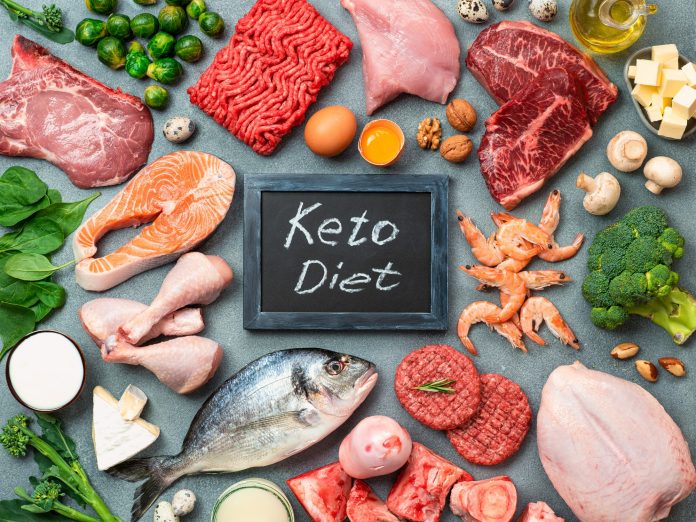The ketogenic diet has gained many supporters in recent years among nutritionists and the fitness group, with a well-defined proposal: reduce the consumption of carbohydrates and increase the intake of fats to help with weight loss.
But can applying this type of food program effectively help people lose weight and even improve their health? Or can this diet bring more problems than benefits?
Understand What The Ketogenic Diet Is
The ketogenic diet is characterized by prioritizing fat (about 60-90% of total calories) and providing necessary amounts of protein (8-15% of calories) with a minimal amount of carbohydrates (2-5% of calories). It is an artificial attempt to mimic a fasting state by limiting carbohydrate consumption and protein metabolism.
This carbohydrate reduction causes a reaction, prompting the human body’s metabolism to trigger a chemical process called ketosis.
Ketosis is a natural metabolic state of the body, which occurs when there is not enough glucose, and the body begins to use existing fat to produce the energy necessary for our vital functions to continue without interruption. Ketosis happens in a compulsory way when the person spends long periods of fasting, for example, or it can also occur in the specific case of the ketogenic diet, which forces a lower level of glucose due to the absence of carbohydrates and more excellent fat. Generating this situation in our metabolism, the body becomes a mighty machine in the ”burning” of fat to generate our ”fuel” (energy) internal.
Ketogenic Diet: What Are The Precautions And Warnings?
We talked to clinical and sports nutritionists to clarify doubts about the ketogenic diet.
1) On The Ketogenic Diet, Can A Person Eat Protein And Fat At Will?
In the model proposed by the American physician Revolutionary Diet in the 70’s, yes. By allowing the patient to eat fats and proteins freely, the diet is self-regulated in calories due to a significant reduction in appetite and the satiating power of fats and proteins.
However, in current models, caloric adjustment is based on specific goals or needs (weight loss, prevention of other diseases such as neurological ones, cancer, hypertension…) and specific amounts of fats, proteins and carbohydrates are then proposed, in addition to the inclusion of some specific supplements.
2) The Idea Of This Diet Is To Leave The Body Without Glucose So That The Metabolism Begins To Burn Fat To Generate Energy, Thus Leading To Weight Loss
Exactly. As carbohydrates are a more straightforward energy source to be used, the proposal is that in the food deprivation of this energy, the depletion of small muscle and liver reserves occurs, and with that, the organism begins to use the energy stores stored in the adipose tissue with better efficiency
3) Is This Healthy?
Healthy is not accumulating energy and getting the body used to use fat efficiently, so if this type of diet leads to this, the answer is yes, it can be healthy to deprive the body of carbohydrates temporarily, but consistently reinforcing that what is suitable for one may not be for the other, so individualization is always the safest and healthiest way.
4) Is The Ketogenic Diet Effective?
Most existing diets, when properly conducted, are effective, and the ketogenic diet follows suit. It is pretty efficient as long as it is practiced with discipline.
5) What Are The Risks Of The Ketogenic Diet?
In carbohydrate-restricted diets, significant improvements in cardiovascular risk factors are observed with a reduction in triglycerides, reduced sensitivity to insulin action and an increase in the HDL-cholesterol fraction; however, an increase in the LDL-cholesterol fraction is observed. The ketogenic diet should be contraindicated when this happens significantly without the other benefits.
The most common complaints are constipation (constipation), headache, cramps, diarrhea, weakness and halitosis.
6) Is There Any Group Or Profile Of Individuals Who Should Not Be On This Type Of Diet?
People who are deficient in carnitine, in enzymes that act to remove fats at the cellular level, or who have porphyria ( a group of rare diseases caused by a defect in the production of hemoglobin enzymes responsible for transporting oxygen in the blood) have difficulties in metabolizing fat as a source of energy.
7) For Diabetics, For Example, Could This Diet Not Generate The Risk Of Hypoglycemia Or Ketoacidosis?
Yes, for insulin-dependent type 1 diabetics, there is a risk of hypoglycemia and ketoacidosis. In light of current knowledge, I would not recommend a ketogenic diet for this type of patient.
For type 2 diabetics, it can be an essential tool not only for weight reduction and appetite reduction, as well as for the reduction of hypoglycemic drugs, but it must be done with professional monitoring by a nutritionist and doctor.
8) Are There Any Side Effects Of This Diet?
All restrictive diets promote changes in digestion and disposition, but ketogenic diets tend to have more records of constipation, headache and cramps.
9) Can This Diet Cause Problems Such As Excess Fat In The Liver And Kidney Stones?
There is no published evidence regarding this.
10) Is There A Risk Of Altering The Balance Of Mineral Salts In The Body?
Possible imbalance of minerals such as magnesium, sodium and potassium can happen, so drinking at least 2L to 3L of water throughout the day and perhaps supplementing the diet with capsules of these salts can be an alternative.
ALSO READ: KETOGENIC DIET: WHAT ARE THE PRECAUTIONS WITH THIS DIET?

